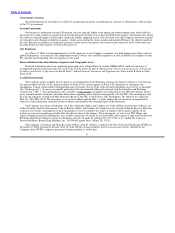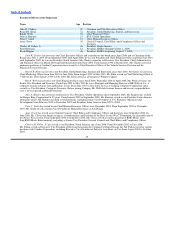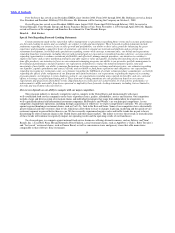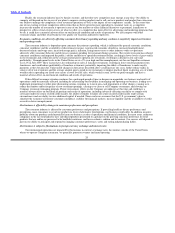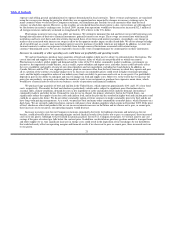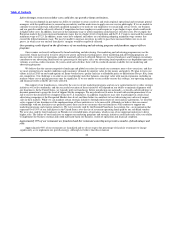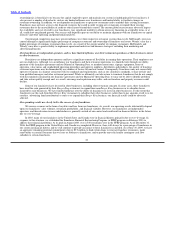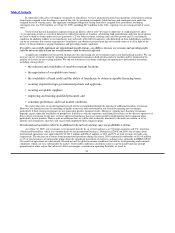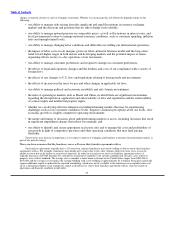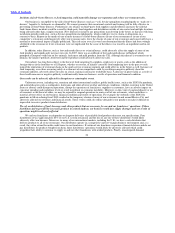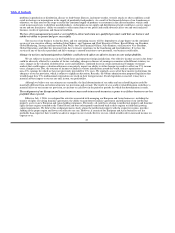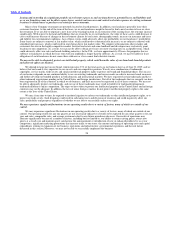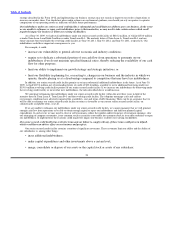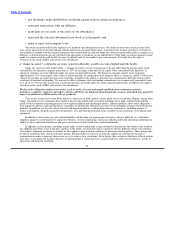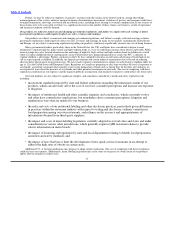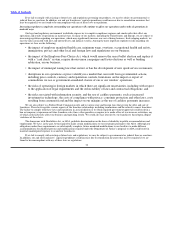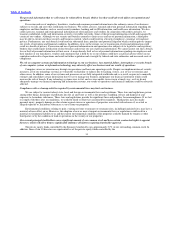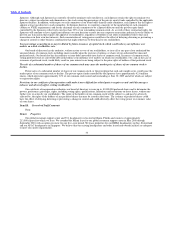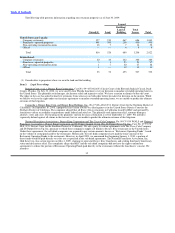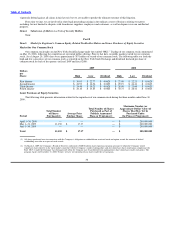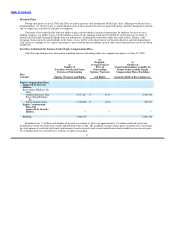Burger King 2009 Annual Report Download - page 29
Download and view the complete annual report
Please find page 29 of the 2009 Burger King annual report below. You can navigate through the pages in the report by either clicking on the pages listed below, or by using the keyword search tool below to find specific information within the annual report.
Table of Contents
problems in production or distribution, disease or food−borne illnesses, inclement weather, terrorist attacks or other conditions could
result in shortages or interruptions in the supply of perishable food products. As a result of the financial distress of our franchisees or
otherwise, we may need to take steps to ensure the continued supply of products to restaurants in the affected markets, which could
result in increased costs to distribute needed products. A disruption in our supply and distribution network could have a severe impact
on our and our franchisees’ ability to continue to offer menu items to our guests and could adversely affect our and our franchisees’
business, results of operations and financial condition.
The loss of key management personnel or our inability to attract and retain new qualified personnel could hurt our business and
inhibit our ability to operate and grow successfully.
The success of our business to date has been, and our continuing success will be, dependent to a large degree on the continued
services of our executive officers, including John Chidsey, our Chairman and Chief Executive Officer; Russell Klein, our President,
Global Marketing, Strategy and Innovation; Ben Wells, our Chief Financial Officer; Julio Ramirez, our Executive Vice President,
Global Operations; and other key personnel who have extensive experience in the franchising and food industries. If we lose the
services of any of these key personnel and fail to manage a smooth transition to new personnel, our business could suffer.
Changes in tax laws and unanticipated tax liabilities could adversely affect our effective income tax rate and profitability.
We are subject to income taxes in the United States and numerous foreign jurisdictions. Our effective income tax rate in the future
could be adversely affected by a number of factors, including: changes in the mix of earnings in countries with different statutory tax
rates, changes in the valuation of deferred tax assets and liabilities, continued losses in certain international Company restaurant
markets that could trigger a valuation allowance or negatively impact our ability to utilize foreign tax credits to offset our U.S. income
taxes; changes in tax laws, the outcome of income tax audits in various jurisdictions around the world, and any repatriation of
non−U.S. earnings for which we have not previously provided for U.S. taxes. We regularly assess all of these matters to determine the
adequacy of our tax provision, which is subject to significant discretion. Recently, the Obama administration proposed legislation that
would change how U.S. multinational corporations are taxed on their foreign income. If such legislation is enacted, it may have a
material adverse impact to our tax rate and, in turn, our profitability.
Although we believe our tax estimates are reasonable, the final determination of tax audits and any related litigation could be
materially different from our historical income tax provisions and accruals. The results of a tax audit or related litigation could have a
material effect on our income tax provision, net income or cash flows in the period or periods for which that determination is made.
The realignment of our European and Asian businesses may result in increased income tax expense to us if these businesses are less
profitable than expected.
Effective July 1, 2006, we realigned the activities associated with managing our European and Asian businesses, including the
transfer of rights of existing franchise agreements, the ability to grant future franchise agreements and utilization of our intellectual
property assets, in new European and Asian holding companies. Previously, all cash flows relating to intellectual property and franchise
rights in those regions returned to the United States and were subsequently transferred back to those regions to fund their growing
capital requirements. We believe this realignment more closely aligns the intellectual property with the respective regions, provides
funding in the proper region and lowers our effective tax rate. However, if certain of our European and Asian businesses are less
profitable than expected, there could be an adverse impact on our overall effective tax rate, which would result in increased income tax
expense to us.
27


